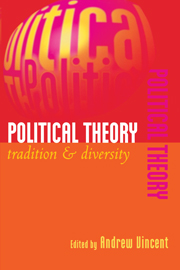Book contents
- Frontmatter
- Contents
- Preface
- List of Contributors
- Introduction
- 1 Political Theory and Conceptual Change
- 2 Political Theory and the Problem of Anachronism
- 3 Utilitarianism as a Public Philosophy
- 4 Rational Choice Political Theory
- 5 Republican Political Theory
- 6 Liberalism, Multiculturalism and Oppression
- 7 Postcolonialism and Political Theory
- 8 Legal Positivism and Political Power
- 9 Political Theory, International Theory, and the Political Theory of International Relations
- 10 Method Matters: Feminism, Interpretation and Politics
- 11 The Political Philosophy of Deleuze and Guattari
- 12 The Object of Political Theory
- Index
12 - The Object of Political Theory
Published online by Cambridge University Press: 29 March 2011
- Frontmatter
- Contents
- Preface
- List of Contributors
- Introduction
- 1 Political Theory and Conceptual Change
- 2 Political Theory and the Problem of Anachronism
- 3 Utilitarianism as a Public Philosophy
- 4 Rational Choice Political Theory
- 5 Republican Political Theory
- 6 Liberalism, Multiculturalism and Oppression
- 7 Postcolonialism and Political Theory
- 8 Legal Positivism and Political Power
- 9 Political Theory, International Theory, and the Political Theory of International Relations
- 10 Method Matters: Feminism, Interpretation and Politics
- 11 The Political Philosophy of Deleuze and Guattari
- 12 The Object of Political Theory
- Index
Summary
My title can be understood in two rather different senses. In the first, the object of political theory is, quite simply, politics itself. Accordingly, this chapter could reasonably be expected to explore the diverse ways in which ‘politics’ and related terms have been understood. In fact, I have addressed this issue elsewhere (1995c; 1996). I have argued that most, if not all, contemporary understandings of politics can be seen as based upon (or descended from) diverse metaphorical elaborations of the idea of politics as attending to the affairs of the polis or to the res publica. That is, they can be seen as variously derived from idealized representations of the public life of the cities of classical antiquity. What these idealizations share is an image of politics as the government of a community of citizens: a community consisting, at least in part, of autonomous political actors. Such an image of politics implies a corresponding view of a nonpolitical domain, but the precise distinction between the two domains has always been open to dispute; the various boundaries that have been proposed have invariably been regarded as somewhat insecure. As a result, the political or governmental sphere is usually thought to be in danger of corruption – if not in fact as already and inescapably corrupted – by the invasions of concerns that properly belong elsewhere, while the non-political domain is thought to be in danger from the tyrannical reach of government.
- Type
- Chapter
- Information
- Political TheoryTradition and Diversity, pp. 254 - 271Publisher: Cambridge University PressPrint publication year: 1997
- 4
- Cited by

